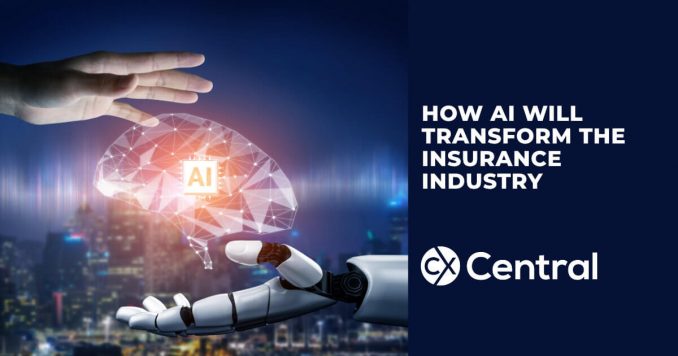
How Artificial Intelligence Can Transform the Insurance Industry
Artificial intelligence (AI) is expected to make a dramatic shift in the working methods of the insurance industry.
Data is AI-based, and therefore the mastery of this technology will become a competitive edge of “smart” insurance companies in the future.
In order to turn AI from a mysterious conception into an affordable technology, insurers should understand its internal mechanisms and potential advantages for business with a view to designate specific areas of AI application and develop an appropriate model for it’s use.
With all insurance companies looking for a competitive edge, the identification of appropriate and necessary applications of AI technology is now becoming a priority for many of the leading insurance companies.
Locally, we’ve seen AAMI implement their Digital People, as just one example.
Artificial intelligence is coming
The annual economic growth of developed countries could be doubled in the near future through the mainstreaming of artificial intelligence.
However, the diffusion of innovative technologies is also a new challenge… or rather, an increased additional risk.
Insurance companies require new risk management strategies to maximise the benefits of AI implementation into society and business.
By 2035, artificial intelligence technologies are expected to raise corporate productivity in 16 industries across 12 branches of economies by an average of 38%.
This is proven by the Allianz survey taken in 2018.
The diffusion of AI technologies — from chatbots to autonomous robotic cars — will transform industry and society in the nearest future.
Artificial intelligence is already being used for productisation through unique information gained due to data analysis and the automatisation of simple tasks.
Expectations of artificial intelligence-based technology are growing, and privately owned corporations are investing significantly to take advantage of it.
How the era of contactless consumption will transform insurance
The era of contactless consumption will accelerate the digital transformation of the insurance industry.
Digital technology and “big data” is reorganising the entire market chain as the contact point is shifted towards mobile channels, while standardised traditional insurance products are being transformed into individual or new niche products reflecting customer needs.
Moreover, the insurance industry is diversifying its services, deepening the connection with other industries such as health or travelling and integrating with medical services such as telemedicine and healthcare management.
Insurers productise related to financial, medicine and medical records, and work closely with hospitals and pharmacies or even provide medical services themselves.
For example, Chinese technology giants Baidu, Alibaba, and Tencent are actively involved with online life insurance.
Travel insurance is also quite common today (albeit down somewhat currently due to COVID) and it’s common for customers to receive both travel and insurance services from the same company.
Customer and sales approaches are rapidly shifting from traditional in-person channels to digital platforms, while mobile apps that provide various financial services through a single platform are amplifying their effect on the insurance market.
The annual KPMG report together with Ventures explores trends in the insurance market.
Innovative applications of platform companies such as Ant Financial (China), Grab (Singapore), Gojek (Indonesia) and Ola (India) are becoming active sales channels for insurance services turning into integrated financial services platforms.
These platforms used to sell products in partnership with insurers, and now they are developing further opportunities.
Individual insurance outputs are produced using Artificial intelligence (AI).
While using wearable devices, personal characteristics and needs may be taken into account during the calculation of the insurance premium.
For instance, American Prudential launched its first digital medical application Prudential Pulse by Prudential, which manages clients’ health by using artificial intelligence related to health in real-time mode.
According to the market forecasts, the various wearable health-related devices will be used on a more frequent basis in the insurance industry as the middle class grows and increase in income.
No doubt, the mainstreaming of artificial intelligence will completely change the global economy, but will also create a number of threats to it.
This refers to insurance companies that will get more work due to the risks caused by the technological revolution.
In simpler terms, the situation is as follows: since the customers take new risks which are nearly concerned with innovative technologies, there is a need to review insurance cover.
The examples in the next paragraph illustrate this point of view.
Case № 1: Autonomous Auto Control
Autonomous vehicle control can be called one of the most well-known areas of the upcoming application of artificial intelligence.
Nowadays a car owner is responsible both for his/her own mistakes in operating the vehicle and for malfunctioning of the car due to incorrect or untimely technical support service.
When it comes to autonomous driving, there will be a growth in the proportion of incidents in which insurers will have to be given redress by the car manufacturer or the AI software provider.
It is reasonable to assume that mandatory car insurance may introduce product liability insurance for the risk mitigation of the car owner, who shifts full control of the vehicle to the vehicle itself.
Case № 2: Cyber Threats
Another example is cyber threats that keep growing by the day.
In response, the insurance market offers appropriate products to insure third-party damage or the company’s own damage on account of the suspension of production or activity caused by the IT systems inaccessibility in the light of the DDoS attacks.
The accompanying expenses are also already covered: assessors to investigate cyber incidents, internal investigation costs, call centre services.
It goes without saying that the demand for such products as business automation is likely only to increase in the coming years.
According to the opinion of Allianz experts, artificial intelligence can enhance the quality of main corporate risks prediction.
For example, transducers on transport containers are already transmitting location data and condition of cargo to the transport company and the insurer.
The acquired information enables the cargo owner to activate insurance coverage or to take measures to cut losses, and the insurance company to optimize insurance coverage.
Customer satisfaction is a must
Under the new insurance model, a customer gets what a customer wants.
Artificial intelligence helps to identify the actual client needs.
Unlike some other industries, the frequency of interaction with the client is relatively low in insurance.
Usually, the latter turn to the insurer when buying a product or claiming damages, and the ability to gain a greater understanding of the insurer’s preferences is extremely important.
Artificial intelligence can also be useful in sorting and analysing client information and providing accurate customer data during the development of successful individual marketing campaigns.
Artificial intelligence technologies will also help to recommend new products to target customers.
In particular, when individual profiles and customer goals are compared automatically to available products.
Considering the fact that insurance products are very complex, artificial intelligence can provide individual illustrations of the product effects and help clients to determine their insurance needs, especially when this is about multi-component products, such as life insurance.
This customised approach could become a driver for the popularisation and democratisation of insurance services.
It is time to act
It’s crucial for those who are just about to explore the opportunities of the most innovative technologies and want to solve the riddle of AI to carry on a successful insurance business.
We suggest the following basic principles on how to change the industry:
✔️ Use the “outside-in” approach: study the data you have or search for the major experts to get an original idea of the potential model of using AI in the insurance business.
✔️ Start in a small way: use less complex applications and gradually move to more complex solutions as the necessary expertise is developed;
✔️ Don`t be afraid of making mistakes: the implementation of AI technologies is difficult, and the path to success is an immediate negative result rather than a long-term waste of resources on prospect-less projects.
Competitiveness in the insurance market will depend on the efficiency of their digital transformation.
Insurers should focus on customer retention approaches to face the new challenges of the digital era.
Final words
It seems fair to say that artificial intelligence has stopped being an attribute of science fiction and is now a reality.
Digital transformation is already well underway in the insurance industry, from sales and distribution to insurance product development, underwriting and claims management and artificial intelligence is the next logical step.
Using customer data related to linked industries such as health care and delivery services, insurers will be able to provide new products, such as demand-driven products (on/off insurance services) and customer service optimisation.
As has been said many times, the future is now and the sooner insurance companies embrace AI, the better the opportunities for long-term success.
Recommended Links:

